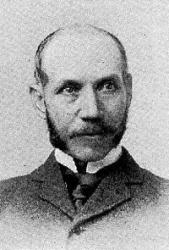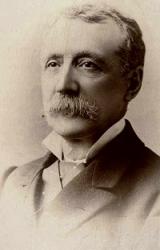Planning worship?
Check out our sister site, ZeteoSearch.org,
for 20+ additional resources related to your search.
- |
User Links
Person Results
‹ Return to hymnal



Export as CSV
Matthias Keller
1813 - 1875 Hymnal Number: 256 Composer of "KELLER" in Gloria Born: March 20, 1813, Ulm, Germany.
Died: October 13, 1875, Boston, Massachusetts.
Keller studied music training in Stuttgart and Vienna, played violin the Viennese Royal Chapel, and was an army bandmaster for several years. He moved to America in 1846, where he played in theaters in Philadelphia, Pennsylvania. He later began making violins, and conducted opera in New York City. His works include:
A Collection of Poems, 1874
--www.hymntime.com/tch
============
Keller was born in Germany. He studied music in Stuttgart and Vienna, he and served as a bandmaster for several years before immigrating to America in 1846. Keller pieced together a living as a performer and violin-maker, but shortly after the Civil War, he tried his hand at composing when the federal government offered a prize for the composition of an original national hymn. When it debuted before the New York Academy of Music, his composition, “An American Hymn,” was poorly received. In fact, the prize committee did not deem any of the entries worthy of an award. But in Boston, Keller’s song was better received, and soon it was a favorite among the city’s wind bands. In attaching his words to this popular song, Holmes hedged his bet; the 50,000 people gathered for the opening ceremonies of the Peace Jubilee were certain to like his piece.
--www.shmoop.com/hymn-of-peace/
Matthias Keller
Josiah Booth
1852 - 1930 Hymnal Number: 267 Composer of "AVONDALE" in Gloria Josiah Booth (27 March 1852 – 29 December 1929) was an English organist and composer, known chiefly for his hymn-tunes.
See also in:
Wikipedia
Josiah Booth
Frederick Alexander Mann
1844 - 1903 Person Name: F. A. Mann Hymnal Number: 277 Composer of "NEW YEAR" in Gloria See his obituary in The Musical Herald, May 1, 1903. The hymnal Hymns of Prayer and Praise (1921) confirms these birth and death dates, in addition to his composing hymn tunes as listed here.
Not to be confused with Frederick Mann, 1846-1928.
--Tina Schneider, 01 July 2014.
=======================
Mr. F. A. Mann was the musical director of the children’s Home at Victoria Park. He possessed a find conception for music; he gave a “reading” and interpretation to everything he touched, even to a children’s hymn. He composed but little; probably his reserve in this respect was due to his high ideals and his reverence for the great masters.
For nineteen years F. A. Mann practiced the musical profession at Lowestoft. Here he was organist successively of the Parish Church of St. Margaret, and of the church at Kirkley. His power as a choir-trainer was soon discovered by other churches, including nonconformists, and by the help of deputies he managed to train three or four choirs abreast.
For fourteen years he devoted himself to training the choir of children belonging to the Children’s Home. Mr. Mann understood children; his poetic musical instinct drew forth their powers; he interested them and they needed no spur.
Excerpt from The Musical Herald, Issues 658-669 (1903)
By John Spencer Curwen
Frederick Alexander Mann
George F. LeJeune

1841 - 1904 Hymnal Number: 29 Composer of "LOVE DIVINE" in Gloria George Fitz-Curwood Le Jeune, 1841-1904
Born: June 18, 1841, London, England.
Died: April 11, 1904, Staten Island, New York.
Buried: Moravian Cemetery, Staten Island, New York.
Le Jeune studied music under Joseph Barnby and George Macfarren in London. In 1863, he moved to Montréal, Canada, where he continued his studies with George Carter. He later moved to America, playing the organ in churches in Hartford, Connecticut, and Philadelphia, Pennsylvania. He became the organist at St. John’s Chapel of Trinity Parish, New York City, in 1876, and also directed the choir there.
Sources:
Hughes, p. 471
--www.hymntime.com/tch
George F. LeJeune
Richard S. Newman
1850 - 1927 Hymnal Number: 269 Composer of "LAND OF REST" in Gloria
Richard S. Newman
Alfred Legge
1843 - 1906 Hymnal Number: 221 Composer of "REST" in Gloria Rv Alfred A K Legge United Kingdom 1843-1919. It is presumed that he was born in Cambridge, England, the son of printer/compositor, William Legge (mother was Mary Legge). Alfred, at age nine, was a chorister in church. He presumably became a minister in Germans, Norfolk. His wife was Theodora Susan Palmer (1848-1908), and it is presumed he named his tune after her. They had a daughter, Theodora Constance Mary, born in 1875, and a son, Alfred Reginald, born in 1878. Alfred A K died at Ashford, Kent, England.
John Perry
Alfred Legge
Hastings Crossley
1846 - 1926 Hymnal Number: 40 Composer of "ANAGOLA" in Gloria Thomas Hastings Henry Crossley, Born: August 8, 1846, Glenburn (near Lisburn), County Antrim, Ireland. Died: March 3, 1926.
Educated at the Royal School of Dungannon, Crossley was a professor of Greek at Bristol University, England, and at Belfast University, Ireland. He also studied music under Berthold Tours. His works include:
A translation of The Fourth Book of the Meditations of Marcus Aurelius, 1882
© The Cyber Hymnal™ (www.hymntime.com/tch)
Hastings Crossley
J. Wakefield MacGill

1829 - 1902 Person Name: Jacob W. MacGill Hymnal Number: 244 Author of "Coming, coming - yes, they are" in Gloria
J. Wakefield MacGill
Francis Turner Palgrave

1824 - 1897 Person Name: Francis T. Palgrave Hymnal Number: 112 Author of "Christ in His heav'nly garden walks all day" in Gloria Palgrave, Francis Turner, M.A., eldest son of Sir Francis Palgrave, the Historian, was born at Great Yarmouth, Sept. 28, 1824, and educated at the Charterhouse (1838-1843) and at Oxford, where he graduated in first class Classical Honours. He was scholar of Balliol (1842) and Fellow of Exeter (1846). He was engaged in the Education Department of the Privy Council till 1884, being also Private Secretary to Lord Granville (then Lord President). In 1885 he was elected Professor of Poetry in the University of Oxford. Professor Palgrave's publications include:—
(1) Idylls and Songs, 1854; (2) Art Catalogue of the Great Exhibition, 1862; (3) Essays on Art, 1866; (4) Lyrical Poems, 1871; (5) Hymns, 1st ed., 1867; 2nd ed., 1868; 3rd ed., 1870. He has also edited, (6) Golden Treasury of English Lyrics, 1861; (7) Sir Walter Scott's Poems, with Life, 1867; and (8) Chrysomela, a selection from Herrick, 1877.
A large proportion of Professor Palgrave's hymns are in common use, the greatest number being in the Marlborough College Hymns, 1869 (5); Thring's Collection, 1882; (4) Horder's Congregational Hymns, 1884 (11); and the Westminster Abbey Hymn Book, 1883 (12). These include:—
i. From his Hymns, 1867-70:—
1. High in heaven the sun. (1867.) Morning.
2. Hope of those who have none other. (1862.) Consolation in Affliction.
3. Lord God of morning and of night. (q.v.) Morning.
4. 0 Light of Life, 0 Saviour dear. (1865.) Evening.
5. 0 Thou not made with hands. (1867.) Kingdom of God within.
6. Once Man with man, now God with God above us. (1868.) Holy Communion.
7. Thou sayest 'Take up thy cross'. (1865.) Taking the Cross of Christ. In Macmillan's Magazine.
8. Thou that once, on mother's knee. (1863-7.) The Child Jesus.
9. Though we long, in sin-wrought blindness. (1868.) Lost and Found.
10. We name Thy Name, O God. (1868.) Lent.
ii. From Other Sources:—
11. Christ, Who art above the sky. em>Christ, the Consoler and Guide.
12. Lord, how fast the minutes fly. The New Year.
13. O God, Who when the night was deep. Morning.
14. 0 God [Lord] Who when Thy cross was nigh. Evening.
15. Thrice-holy Name that sweeter sounds. Litany of the Name of Jesus. From the School Guardian, 1883.
These hymns, in common with others by Professor Palgrave are marked by much originality of thought and beauty of diction, as well as great tenderness. His object was "to try and write hymns which should have more distinct matter for thought and feeling than many in our collections offer, and so, perhaps, be of little use and comfort to readers," and he has admirably succeeded in his object. He died Oct. 24, 1897. [Rev. W. Garrett Horder]
-- John Julian, Dictionary of Hymnology (1907)
Francis Turner Palgrave
Harriet Parr
1828 - 1900 Person Name: Harriett Parr Hymnal Number: 11 Author of "Hear our pray'r, O heav'nly Father" in Gloria Pseudonym: Holme Lee
Parr, Harriet, was born at York in 1828, and has published several works under the nom de plume of "Holme Lee," including Maude Talbot, 1854; Sylvan Holt’s Daughter, 1858; Warp and Woof, 1861; Mr. Wynyard's Ward, 1867; and several other works of fiction. Miss Parr is known to hymnology by one hymn only, viz.:—
Hear my [our] prayer, 0 heavenly Father. Evening. This beautiful and pathetic hymn appeared in her story The Wreck of the Golden Mary, which was the Christmas number of Charles Dickens's Household Words, 1856. The way in which the hymn is introduced into the story has been often told, and is worth repeating. The story sets forth how the ship Golden Mary, on her voyage to California, struck on an iceberg, and the passengers, taking to the boats, suffered privations for several days. To beguile the time they repeated stories. One of them, Dick Tarrant, a wild youth, relates some of his experiences, in which he says:—
“What can it be that brings all these old things over my mind? There's a child's hymn I and Tom used to say at my mother's knee, when we were little ones, keeps running through my thoughts. It's the stars, may be; there was a little window by my bed that I used to watch them at, a window in my room at home in Cheshire; and if I were ever afraid, as boys will be after reading a good ghost story, I would keep on saying it till I fell asleep."
”That was a good mother of yours, Dick; could you say that hymn now, do you think ? Some of us might like to hear it."
"It is as clear in my mind at this minute as if my mother was here listening to me," said Dick. And he repeated
" 'Hear my prayer, O Heavenly Father,
Ere we lay us down to sleep,' " &c.
Through the instrumentality of Dr. Allon it was included in the New Congregational Hymn Book, 1859, No. 945, in 5 st. of 4 1. Since then it has reappeared in numerous collections in Great Britain and America. In some hymn-books, as in Thring's Collection, 1882, it begins, "Hear our prayer, O heavenly Father," and a doxology is added. Instead of the doxology, the Rev. W. J. Hall added the following lines (written in 1873).
"Home of rest and peace unending,
Whither turns my longing heart,
Home from whence thro' all the ages
Never more shall I depart."
This addition was given in the New Mitre Hymnal, 1875. In the Parish Hymn Book, 1863 and 1875, it is a Morning hymn, and begins:—
"Praise to Thee, Whose hosts have watched us
Through the helpless hours of sleep," &c.
-- John Julian, Dictionary of Hymnology (1907)
Harriet Parr


 My Starred Hymns
My Starred Hymns


